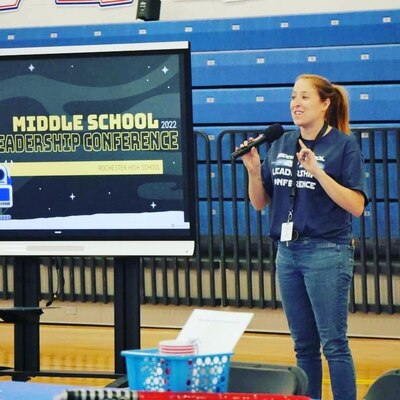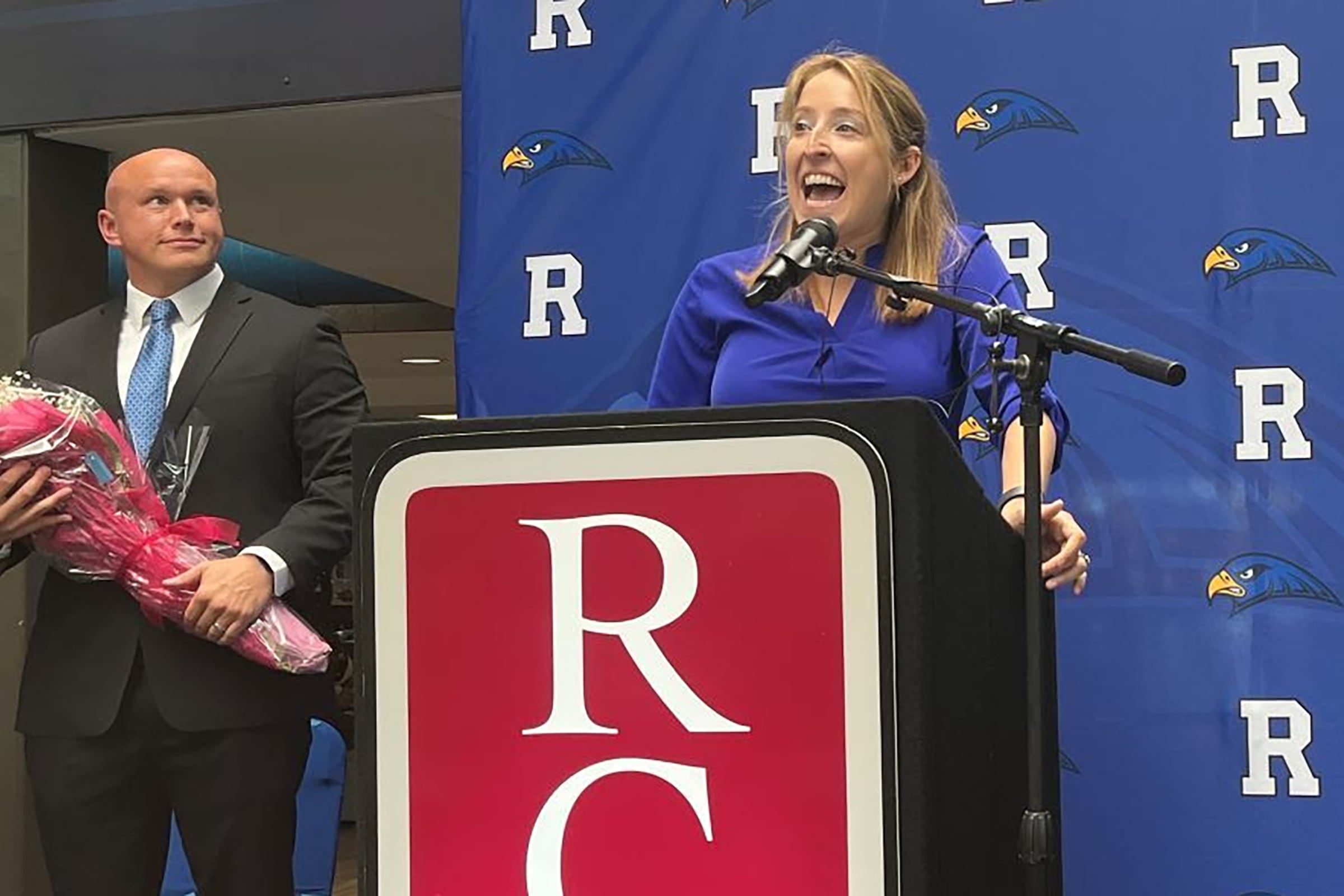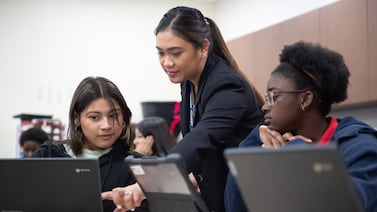Sign up for Chalkbeat Detroit’s free daily newsletter to keep up with the city’s public school system and Michigan education policy.
Kelley Cusmano teaches a student leadership class at Rochester High School in suburban Detroit, and those leadership skills may come in handy as she embarks on an effort to address teacher retention in Michigan.
Cusmano was named Michigan Teacher of the Year in May, and she and the other nine finalists for the top teacher honor in the state got together and decided as a group to focus on retention issues, for some crucial reasons.
“The state has invested millions of dollars in confronting the teacher shortage, but we need teachers to remain in the classroom in order for that investment to pay off,” said Cusmano, who also teaches English language arts at Rochester High.
They’ll have a platform to address the issue. Cusmano and one of the finalists present before the State Board of Education monthly. During the October meeting, she and Molly Dunham, a third grade teacher in the Kingsley Area Schools district, spoke about the value of mentorship programs for new teachers.

Part of addressing teacher retention will be changing the narrative “that teachers, and in particular, teachers that belong to a union, have different priorities than the families we serve,” Cusmano told Chalkbeat.
“Teachers are concerned that the respect for the profession and the partnership with families is being fractured, and it is crucial that the stories of all the amazing educators I get to see every day are told to a larger audience.”
She spoke with Chalkbeat about retention, teacher morale, student leadership, and the teacher classes she and her twin sister, a fellow Michigan educator, held as children.
This interview has been edited for length and clarity.
How and when did you decide to become a teacher?
From a young age, I knew that I wanted to work with kids. I was inspired by spending a lot of time in my mom’s classroom — she taught kindergarten in Concord, Michigan — and my identical twin sister and I would spend hours reading books to kids, playing on the playground with them, etc. However, as I got older, I actually became interested in writing/journalism as a career, so I entered Michigan State University as a journalism major. I knew I still wanted to work with kids, so I blended both of my loves and decided to become a high school English teacher.
What’s your favorite lesson to teach and why?
I like any lesson that makes a student take a step back and realize that the world is a much bigger place than what they think. Books have that power, and a really transformative text can take a student to a greater understanding of society. Right now, “Fahrenheit 451″ has a lot of modern-day parallels to our society, so I love teaching that text and letting students know that [Ray] Bradbury had a lot of predictions in the 1950s about the direction of our current society.
What’s something happening in the community that affects what goes on inside your classroom?
I think any event happening in the community will have ripple effects in the classroom. For example, we just recently experienced the presidential election, and there are passionate individuals for both parties. Obviously, those feelings are going to come up any time we talk about a social issue that can be seen in a text. However, as an English teacher, I really try to focus my students’ understanding on the world as a whole, not just political talking points.
How do you approach news events in your classroom? Please provide an example.
With caution, thoughtfulness, and care. For example, our district is in close proximity to the town of Oxford, which experienced a school shooting in 2021. Obviously, we were rocked by the event, and many staff members and families had people in their lives that were impacted by the tragedy. As a staff, we provided students and other staff members with the emotional support that was needed, but we also made sure that other students, who may not have been directly impacted, were instructed on how we were going to handle academic work for the short-term and long-term.
Tell us about your own experience with school and how it affects your work today.
I had some amazing teachers. Some of my favorites were my high school English teachers, which led me to my career today. I grew up outside of Jackson, Michigan. My seventh grade English teacher, Mrs. Short, was absolutely transformative to me. She allowed me to read books beyond what was assigned in class and sent me to a high school writing camp as a middle schooler. Basically, she told me that I was a talented writer, and I believed her. That type of belief in kids is how I try to connect with my students today. In addition, I loved the events of school — the dances, the assemblies, the service — and so as a student leadership teacher, I love being able to advise students on how to be leaders in their school.
How do you take care of yourself when you’re not at work?
I love spending time with my husband and my two daughters; Annabel is 13 and Mia is 11. When I’m not with them, I’m snuggling with our rescue pittie, Bonnie, or talking on the phone to my twin sister, Sarah. She is also in education, so she is the perfect sounding board for me. I also love to listen to true-crime podcasts and travel.
In Michigan, teacher morale has been an issue. What do you think can be done to address it?
I think it gets started with taking any issue with a teacher or class off of social media. Our society has used social media as a sounding board, and all that does is paint a one-sided picture of a complex issue. Families and educators need to be able to have in-person conversations again. We need to stop thinking of schools and teachers as faceless entities but as living, breathing humans who deserve to be respected and treated fairly. Also, I think teachers need to be compensated according to the difficulty of their jobs and provided with clear and transparent policies and structures.
Tell me how you came to teach a student leadership class and what have you learned about students from teaching this class?
I started teaching the student leadership class at RHS when the previous adviser decided they wanted to stop. I had never been at a school that offered leadership as a part of their curriculum, but I quickly realized how valuable of an asset having leadership as a part of a student’s day can be. My students are involved in every student activity at Rochester High. In a true project-based learning experience, they are able to execute activities from beginning to end, handle thousands of dollars in financial transactions, and learn budgeting, fundraising, and event-planning skills from Day 1. In addition, I feel like I learn every day from students how capable and responsible they can be. The larger perception from society is that teenagers cannot handle complex tasks, but they can and should.
Lori Higgins is the bureau chief for Chalkbeat Detroit. You can reach her at lhiggins@chalkbeat.org.







